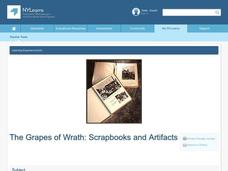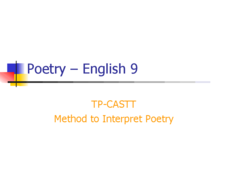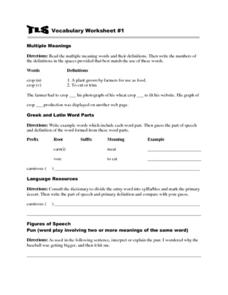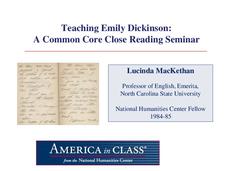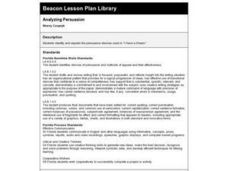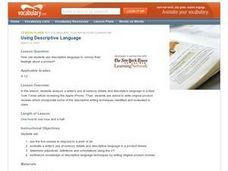Curated OER
Word Origins
Have you ever studied historical words and found that they were deeply rooted in racism or prejudice? Select a long list of these words to have your class examine. What familiar roots do they have? Do they know when this word originally...
Novelinks
Words by Heart: Guided Imagery
Sad, depressed, miserable, inconsolable, forlorn: so many synonyms have a lot of variety with their connotations. Through the guided imagery activity, writers explore the use of connotation and its influence on imagery and description by...
Curated OER
Figurative Language
Have your kids read twelve sentences and underline figurative language in each sentence. They will better grasp connotative and denotative language by rewriting the sentences with the same meaning omitting the figurative language.
Curated OER
Speak Write! Understanding the Hidden Meaning of Words
Young scholars investigate connotation and denotation as a basis for greater examining of language. They identify the literal meaning of words and explore the greater implications and impact of word usage.
Curated OER
The Grapes of Wrath: Scrapbooks and Artifacts
Students complete research to enhance their reading of "The Grapes of Wrath". Using the text, they identify and locate cultural artifacts and discuss their symbolic connotations. As a class, they create a museum exhibit of the various...
Curated OER
Close Reading
Eleventh graders read and study Hamlet. Then they are introduced to close reading as a means of understanding what is being read--not only understanding the printed word, but also the nuances and connotations of language as it is used by...
Alabama Learning Exchange
Poetry-English 9
Are your readers lost in the world of poetry? Show them this basic presentation to study elements of a poem. They learn the importance of the title, paraphrasing, connotation, tone, shifts, and theme.
Shmoop
ELA.CCSS.ELA-Literacy.RL.11-12.4
Your assessment is to figure out if I am being figurative or connotative with this statement: This is a great resource. Can’t do it? Then you had better review how to break down Common Core skill RL.11-12.4. In simple language that you...
Pennington Publishing
Vocabulary Worksheet #1 & #2
These two worksheets cover several grammatical topics. Pupils work on words with multiple meanings, Greek and Latin word parts, word connotations, academic language, and more. The result is seven quick exercises that could be used...
Novelinks
The Little Prince: Brainstorming Activity
What do you think of when you hear the word adult? Or friend? Learners brainstorm with a group of peers to list the words they think of when they hear seven words from Antoine de Saint-Exupéry's The Little Prince.
Prestwick House
"Because I could not stop for Death" -- Visualizing Meaning and Tone
Emily Dickinson's "Because I could not stop for Death" provides high schoolers with an opportunity to practice their critical thinking skills. They examine the images, diction, rhythm, and rhyme scheme the poet uses and consider how...
National Humanities Center
Teaching Emily Dickinson: A Common Core Close Reading Seminar
Three of Emily Dickinson's poems, "I like to see it," "Because I could not stop for Death," and "We grow accustomed to the Dark," provide instructors with an opportunity to model for class members how to use close reading strategies to...
Curated OER
What's So Bad or Good About Conflict?
Learners of all ages discuss how conflict can be negative and positive. First, they create a class bulletin board about conflict, and provide their thoughts and connotations surrounding the word. In a class discussion, they ask questions...
Curated OER
Analyzing Persuasion
A reading of Dr. Martin Luther King Jr.'s "I Have a Dream" speech launches a study of rhetorical devices such as hyperbole, allusion, metaphor, simile, personification, connotative language and parallel structure. Class members then...
Curated OER
Formal and Informal Language
Words carry connotative baggage and some suitcases are bigger than others. Learners consult the Chambers School Dictionary to identify the formal, informal or slang words used in a series of exercises.
Penguin Books
A Teacher's Guide to the Signet Classics Edition of H.G. Wells's The Time Machine
Imagine being able to travel back and forth in time! H.G. Wells uses that scenario in his novel The Time Machine to comment on what he saw as the flaws in Victorian society and the industrial age. This teacher's guide is one of the best...
Curated OER
Using Descriptive Language
Students examine the use of adjectives in a product review, then write their own descriptive review. In this writing and word usage lesson plan, students first analyze the choice of adjectives in a New York Times article about the...
EngageNY
Grade 9 ELA Module 1, Unit 1, Lesson 1
Word choice can drastically alter the tone of a piece of writing. Ninth graders read Karen Russell's short story "St. Lucy's Home for Girls Raised by Wolves" and use textual evidence to help them analyze how word choice affects their...
Curated OER
Practice Book O
Whether you need resources for reading comprehension, literary analysis, phonics, vocabulary, or text features, an extensive packet of worksheets is sure to fit your needs. Based on a fifth-grade curriculum but applicable to any level of...
Santa Ana Unified School District
Early American Poets
The poems of Walt Whitman and Emily Dickinson are the focus of a unit that asks readers to consider how an artist's life and changes in society influences his or her work. After careful study of Whitman's and Dickinson's perspectives on...
California Federation of Chaparral Poets, Inc
Poetic Devices
Have everything you need to know about the elements of poetry with a nine-page handout. Split into four categories—word sounds, meanings, arrangement, and imagery—budding poets may reference terms, read definitions, descriptions, and...
Portland Public Schools
Teaching Tone to Teenagers
Tone is a tough topic to teach to teenagers. But never, fear, help is here in the form of a unit plan that takes advantage of their interest in music to set the stage for a series of activities that lead them to understand how setting,...
Film Education
Nineteen Eighty-Four: Orwell
Warning or prediction? Nineteen Eighty Four is the anchor text for a series of tasks that ask readers to compare the novel to the film as well as current events to those pictured in George Orwell's dystopian classic.
Deer Valley Unified School District
Close Reading: Analyzing Mood and Tone
The AP Literature and Composition exam is all about close reading. Test takers are presented with a passage and asked to analyze how an author uses literary devices to create a desired effect. Prepare your students for the exam with a...
Other popular searches
- Connotation and Denotation
- Connotation Worksheets
- Connotation Words
- Connotation Denotation
- Connotation vs. Denotation
- Poetry Connotation
- Connotation vs Denotation
- Word Connotations
- Connotations and Denotations
- Connotation, Denotation
- Connotations of Words
- Denotation and Connotations






